1890-1914 Wilhelmine Germany: A-level AQA Germany 1871-1991
1/134
There's no tags or description
Looks like no tags are added yet.
Name | Mastery | Learn | Test | Matching | Spaced |
|---|
No study sessions yet.
135 Terms
Kaiser Wilhelm II
Kaiser of Germany (1888-1918)
- Ambitious and intelligent
- Arrogant, erratic, dramatic, unpredictable
- Suffered from childhood trauma, and paralysed left arm
- Believed in Divine Right of Kings
- Obsessed with the military
- Unstable, suffered mood swings
1888-1898: Averaged 200 days a year out of Berlin, on official business or private recreation, so wasn't around to lead details of govt policy
- Aggressive nature and reliance of advisors led to WW1
- Political success relied on pleasing him
- Initially supported state socialism, switched to advocating forceful oppression of SPD
- Frequently changed Chancellor
- Wanted his Chancellor to obey him
- Increased Germany's power
- Wanted to rule himself but largely failed
- Lacked understanding of key issues
- Wanted a navy to rival Britain's, this was a mistake as Britain wouldn't be intimidated or threatened, leading to the Arms race (1906-1914) and the downturn of Anglo-German relations that led to WW1
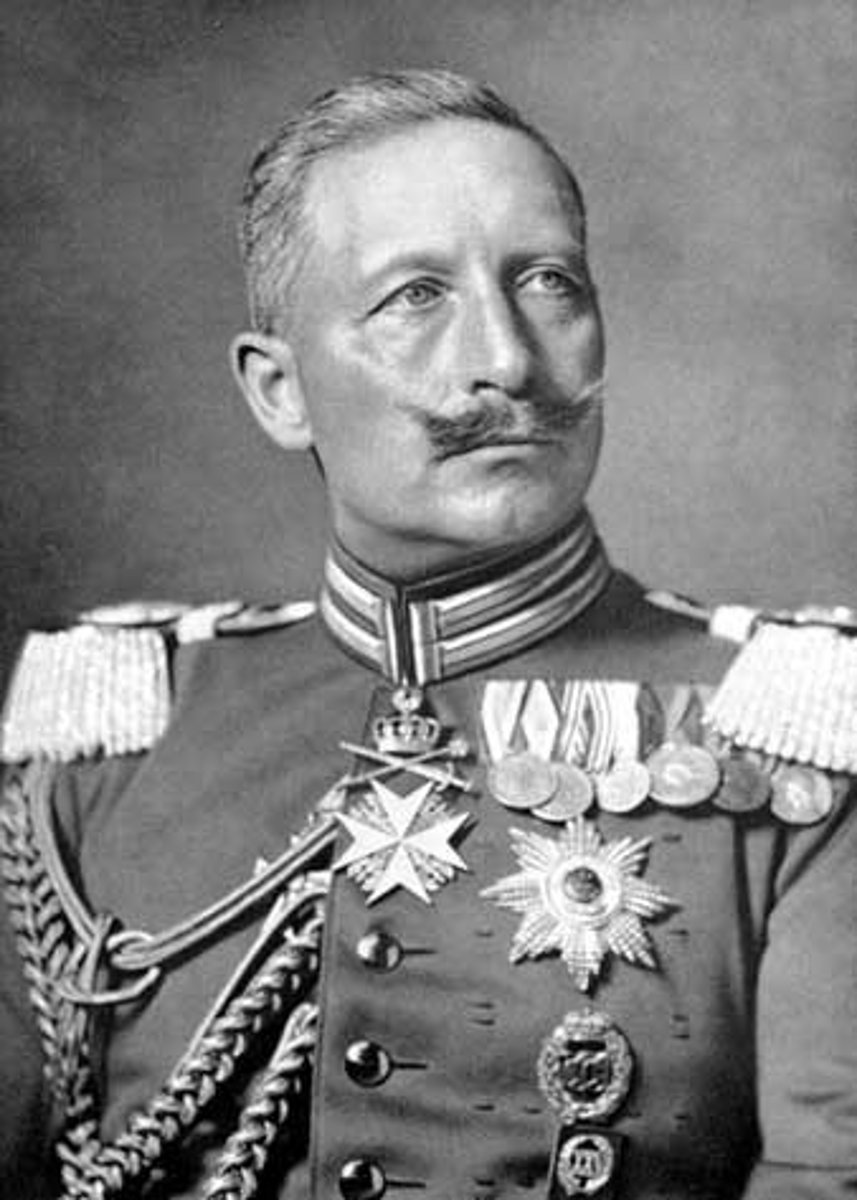
Wilhelm II's personality
- Ambitious, romantic dreamer
- Fast mind, good memory
- Arrogant and dramatic
- Erratic and unpredictable
- Autocratic, militaristic, and racist
- Suffered from childhood trauma, and paralysed left arm
- Believed in Divine Right of Kings
- Obsessed with the military
- Suffered mood swings
- Prone to outbursts
- Troubled relationship with parents, possibly suffered from child abuse
- Possibly had ADHD
German constitution
Founding document of the Second Reich
Government type: Federal parliamentary monarchy
Head of State - Kaiser (also Kaiser of Prussia)
Head of Government - Chancellor (also PM of Prussia)
National Parliament - Reichstag
Federal Council - Bundesrat
- One of the most democratic in the world at the time
Chancellor
Chief Minister of the Reich
- Appointed by the Kaiser
- 2nd most important office in Germany
- Only responsible to the Emperor
- Decided policy outlines
- Chaired sessions of the Bundesrat
- Appointed state secretaries
- Could ignore resolutions passed by the Reichstag
Three-class system
An electoral system where the value of your vote corresponds to your position in the social hierarchy.
Used in Prussia
- Led to increased right-wing dominance in Prussian parliament, making it difficult for Chancellors caught between liberal Germany and conservative Prussia
1908 Prussian election
SPD win 23% of vote, get 7 seats
Conservatives win 16%, get 212 seats
- Shows impact of 3-class system
General Leo von Caprivi
- Chancellor 1890-1894
- No political background, but good at admin
- Established his 'New Course' programme
- Mind of his own
- Wanted social reform to control socialism
- Made concessions to socialists, Poles, centrists to win support of Reichstag
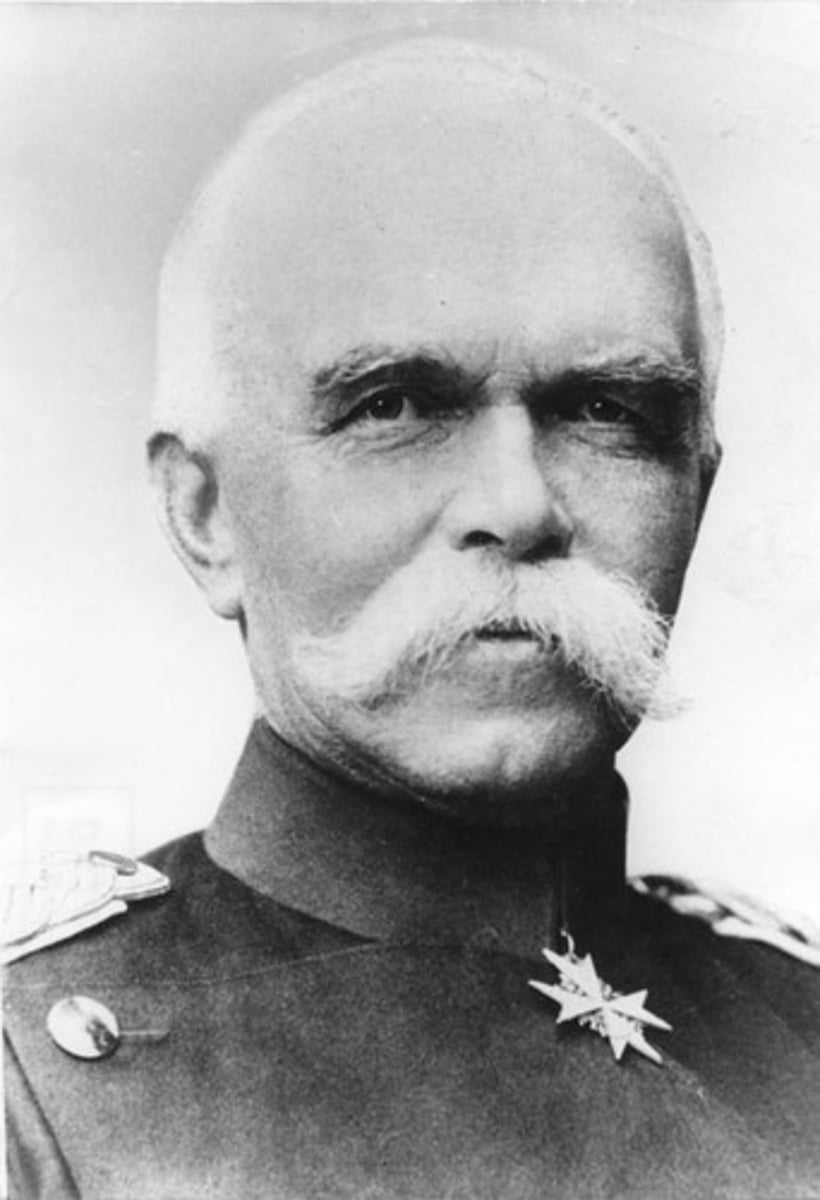
Caprivi's new course
Social reform
- Relaxing Kulturkampf
- Allowed anti-semitic laws to lapse
- Restrictions on working hours, 1891
- Banned working on Sunday, 1891
- Illegal for children under 13 to work, 1891
- Army Bill, 1892
Tariff reform - Treaties with Austria, Italy and Russia to reduce tariffs, wanted to lower taxes
Social reform,
1891
Measures introduced by Caprivi as he had Reichstag support from concessions made the year before
- Banned Sunday work
- Banned employment of under-13s
- Banned women working more than 11 hours a week
- Set up courts to settle industrial disputes
Concessions made by Caprivi
Socialists, Poles, Centrists
Anti-socialist laws lapsed
Schools allowed to use Polish for teaching purposes.
Tariff reform
Caprivi - Overturned the 1879 Tariff act
- Lowered tariffs
- Prompted by wheat shortages
- Series of trade deals with neighbouring countries
- Promised to lower tariffs on agricultural imports in return for favourable rates of manufactured goods
- Supported by most parties
- Opposed by Conservatives and Agrarian League
- Very controversial
Bulow - Compromised between left and right parties
- Huge Reichstag majority returned tariffs to pre-1892 levels
- Opposition to high tariffs led to 26 extra seats for SPD in 1903 election
Agrarian League
Anti-semitic pressure group founded in 1893. Supported the interest of farmers and industrialists
- Well organised
- Popular in Eastern Prussia
- Wanted subsidies, import controls, price fixing to protect German farmers
- Opposed free trade & tariff reform
Denounced Caprivi as a socialist through propaganda campaign
Army bill
1892
- Increased size of army to 84,000
- Reduced mandatory conscription from 3 years to 2
- Helped lead to Caprivi's downfall as it angered the left and the right
- Defeated in the Reichstag, leading to 1893 election
1893 election
Caprivi dissolved the Reichstag after they defeated the 1892 Army bill
Centre - 96 seats (-11)
German Conservatives - 69 seats (-2)
National Liberals - 51 seats (+13)
SPS - 44 seats (+9)
New Reichstag passed the Army bill
Wilhelm concerned by SPD's victory, pressed Caprivi to introduce anti-socialist bills
Opposition to the army bill
- Army officers didn't like the reduced conscription
- Right didn't like reduced conscription
- Left didn't like increasing size of peacetime army
Defeated the bill, so Caprivi dissolved the Reichstag
Alliance of rye and steel
Coalition of interests between industry and agriculture who supported protectionism
- Broken by Caprivi's tariff reform
Caprivi’s fall
Kaiser greatly worried about 1893 elections and a series of anarchist outrages across Europe.
Pressured Caprivi to draw up new Anti-Socialist measures which the Reichstag would not accept.
Caprivi forced to resign having lost his confidence, especially after the Kaiser’s plan to change the constitution to give himself more power at the expense of the Reichstag.
Caprivi's failures
- Limited by Kaiser
- Failed to control Agrarian League
- Free thinking nature angered Wilhelm
- Disagreed with Wilhelm over socialism
- New Course angered Junkers
Caprivi's successes
- Relaxing Kulturkampf
- Social reform
- Working with the Reichstag
- Willing to work with both left and right
- Tariff reform
- Passed Army bill by dissolving Reichstag
Prince Hohenlohe
Chancellor of Germany & Prussian PM (1894-1900)
Minister President of Bavaria (1866-1870)
- Straw doll to the Kaiser
- Just did as the Kaiser asked
- Introduced Sammlungspolitik
- Limited political experience, no policies of his own
- Centre-left
- Catholic, but didn't like the Zentrum Party, and refused to condemn Kulturkampf
- Led to deadlock in Reichstag
Hohenlohe's response to socialism
Mildly Liberal but happy to respond to demand to be anti-socialist
1894-1895: German and Prussian govts crackdown (reactionary rule)
- SPD offices in Berlin ransacked
- SPD leaders put on trial
- Prussians suspected of sympathising with socialism were fired
- Wilhelm advocated forceful oppression of SPD
- Led to deadlock as Reichstag refused to pass any bills
Socialism timeline
1888 - Wilhelm II becomes Kaiser
1889 - Bismarck tried to make Anti-Socialist permanent. Wilhelm II wanted it watered down
Jan 1890 - Reichstag rejects making the Anti-Socialist bill permanent
Feb 1890 - Wilhelm promises new social legislation, Bismarck doesn't agree. Right do badly in elections and Left gain
1890 - Bismarck proposes altering the constitution to be very anti-socialist. Wilhelm refuses
1894 - Subversion bill is defeated by the Reichstag
1894-1895 - Prussian and German crackdown on socialism
1897 - Reichstag in deadlock with Kaiser, refuse to pass any bills
1898 - Wilhelm says any strikers should be imprisoned with penal servitude
1899 - Anti-Union bill is defeated by Reichstag
- Wilhelm says the SPD leaders should be shot
1900 - Berlin tram workers go on strike, Wilhelm orders they be shot, they aren't
General Waldersee
Chief of the General Staff (1888-1891)
From 1897 there was talk of him leading a military coup to overthrow the constitution
- Nothing came of this
Sammlungspolitik
Collection policy
The government's policy of unifying and concentrating a population in favour of the Reich and the Kaiser
- Intended to polarise German society into 2 camps: respectable loyal Germans, and the radical socialists
- Intended to win back support of middle class and reunite industrialists and Junkers
- Policy after 1897
- Went hand in hand with weltpolitik
- Hohenlohe encouraged Wilhelm to appoint his own Ministers
Hohenlohe's actions
Only did what the Kaiser told him too
- Introduced Sammlungspolitik
- Encouraged Kaiser to appoint his own ministers
- Painted SPD as the enemy
- Navy bill, 1898
- Used an issue over China as an excuse to resign
Ministers appointed by Kaiser
Miquel - Prussian Minister of State
Koller - Minister of Interior (till 1895)
Bulow - Foreign Minister
Admiral von Tirpitz - Navy Secretary
Count von Posadowsky-Wehner - Minister of interior (post 1895)
Coincided with emergence of weltpolitik
Weltpolitik
World politics
The policy of making Germany a major global power through an expanding navy and the acquisition of colonies
- Twinned with sammlungspolitik
- Wilhelm II's dream
- German policy after 1897
- Turning point in German history
- Wilhelm wanted Germany to be on par with UK
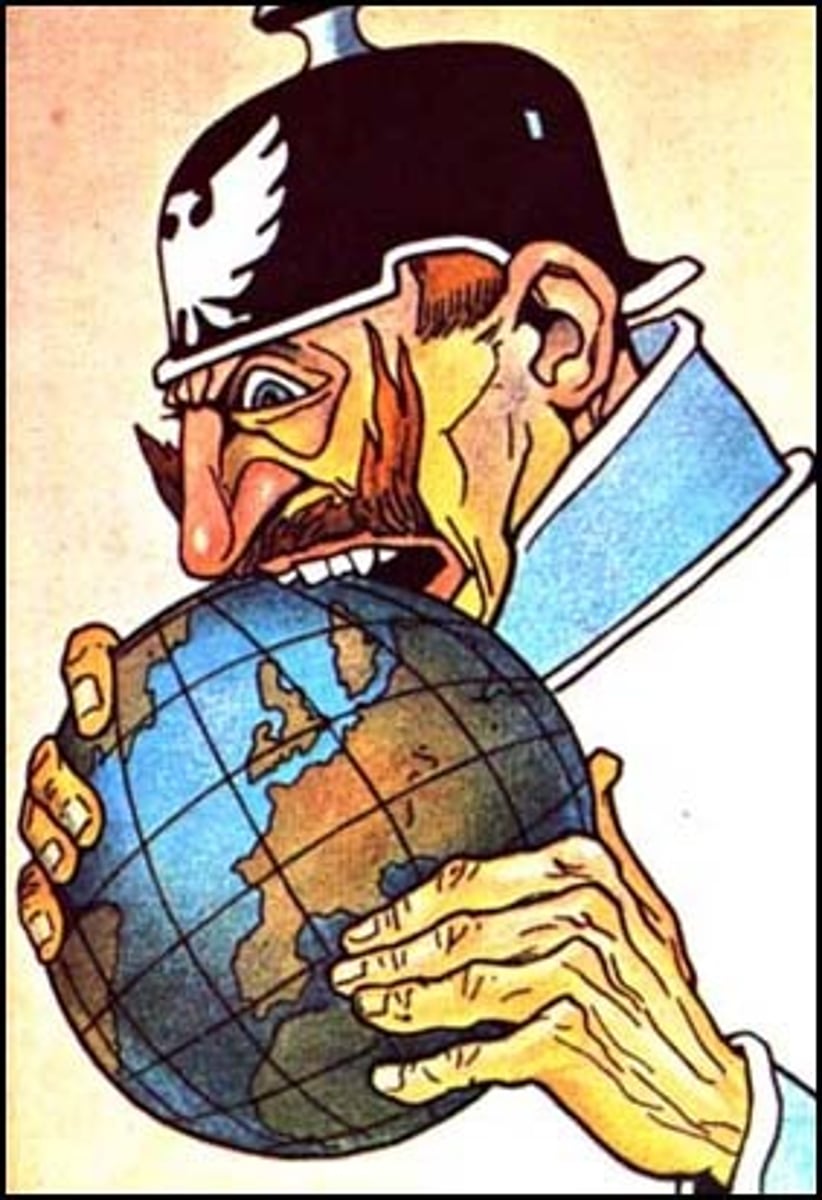
Reasons for Weltpolitik
- Wilhelm II's love-hate relationship with Britain
- Rally support around Kaiser and divert attention from socialist threat (structuralist view)
- Industrialisation created demand for raw materials and markets beyond Europe
- Nationalists wanted Germany to have prominent position on world stage
- Pressure groups like Navy League and Pan-German League popularised it and pressurised govt into implementing it
German foreign policy
- Weltpolitik
- German 'masculine' superiority over 'feminine' Latin and Slav 'degeneracy'
- Drove France and Russia together
- Naval expansion alienated UK, leading to Triple Entente with France and Russia
Naval expansion
Wilhelm wanted a navy to rival Britain's so they'd respect Germany
- Would symbolise German growth and strength
- Led by Admiral Tirpitz (Navy Secretary)
- Navy League set up to advocate for this
Navy Bill, 1898 - Construction of 16 dreadnoughts
Naval Law 1900 - Construction of 3 battleships a year for 6 years
- Both passed with large majorities
- Antagonised Britain as their dominant navy was the basis of their world power, souring Anglo-German relations and contributing to WW1
Navy League
Pressure group set up by Admiral Tirpitz to put pressure on the Reichstag to gain funding for Naval expansion
- Founded in 1898
300,000 members - One of the largest pressure groups
- Supported by key industrialists (e.g. Krupps)
Subversion bill
1894
The first anti-socialist bill that Wilhelm wanted Hohenlohe to pass. It was rejected by the Reichstag
Anti-Union bill,
1899
The second anti-socialist bill that Wilhelm wanted Hohenlohe to pass. It was rejected by the Reichstag
Navy bill,
1898
Start of German naval expansion
- First measure of weltpolitik
- Ordered construction of 16 battleships
- Some opposition from right as they thought money would be better spent on the army
- Some opposition from left as they opposed any increase in military spending
- Passed 212 votes to 139
Followed by another law in 1900 to build 3 new battleships a year
Hohenlohe's successes
- Reorganisation of government
- Roused national sympathy and nationalism
- Rise of navy power
Hohenlohe's failures
- Unable to pass anti-socialist bills
- Puppet to Wilhelm
- Didn't do anything on his own
Bernhard von Bulow
Chancellor of Germany and Prussian PM (1900-1909)
Foreign Minister (1897-1900)
- Junker
- Groomed for office by Eulenburg
- First Chancellor the Kaiser trusted
- Believer in Weltpolitik
- Bogged down by affairs
- Introduced social reform
- Favoured expansion
- Daily Telegraph affair lost him the Kaiser's favour, and being defeated by the Reichstag trying to increase taxation forced him to resign
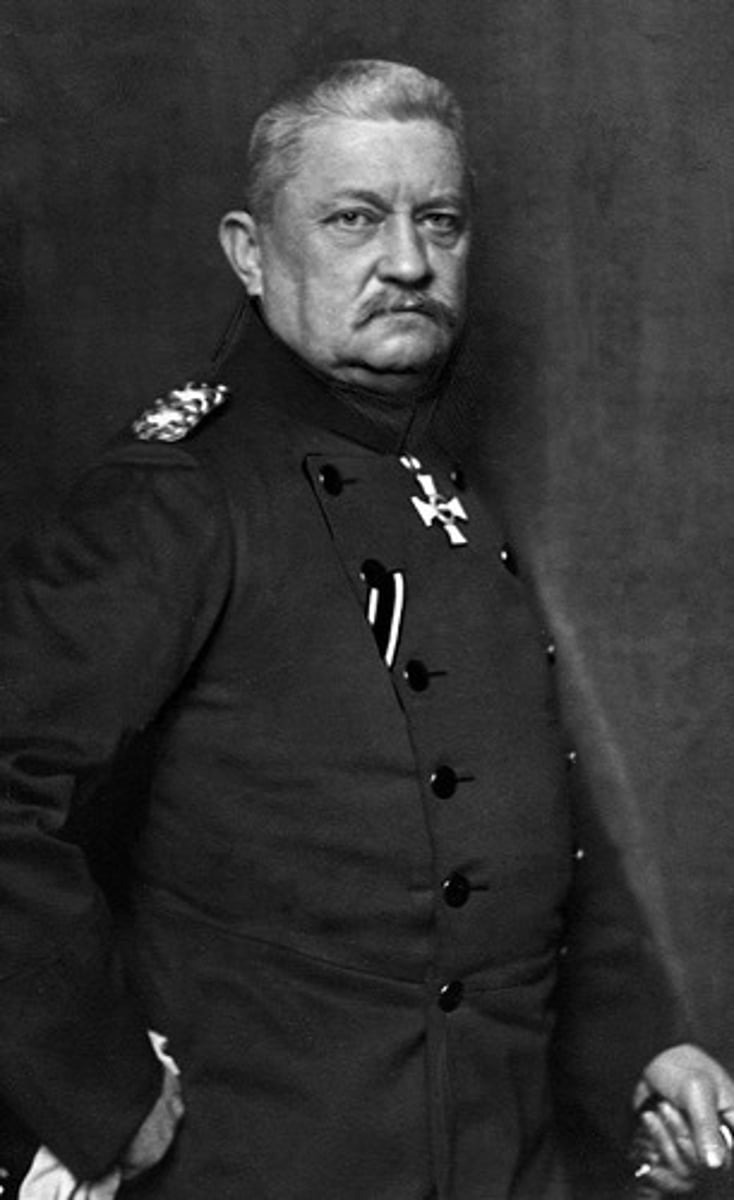
Bulow's actions
Social reform - Wanted to gain support of w/c. Abandoned anti-socialist aspect of Sammlungspolitik
Tariff reform - Reversed Caprivi's reductions to fund the navy. Restored duties to 1892 levels
- Hottentot election
- Eulenburg affair
- Daily Telegraph affair
Social reform under Bulow
Abandoned anti-socialist aspect of sammlungspolitik
Aimed to win support of working class
1900 - Period to claim accident insurance increased
1901 - Industrial disputes courts made compulsory in towns of 20,000+
1903 - Health insurance extended, limitations on child labour
Tariffs under Bulow
Left called for lower tariffs to reduce food prices.
The Agrarian League demanded higher tariffs.
Bulow restored them to the pre-1882 level.
Popular opposition to the higher tariffs won the SPD 26 more seats.
Financial problems
Maintaining the army, expanding the navy and running the empire created a large budget deficit.
Indirect taxes and inheritance taxes.
Opposed by left - indirect taxes.
Opposed by right - inheritance taxes.
Inheritance tax weakened so much that it had little financial impact.
Hottentot election,
1907
- Criticism over treatment of rebels in German controlled South-West Africa
- Zentrum and SPD unite to resist colonial expansion
- Bulow dissolves Reichstag and leads pro-government propaganda campaign
- This along with anti-catholic and anti-socialist feelings swings the vote
- Fear of a return to Kulturkampf leads to moderate gains by Zentrum party
Centre - 101 seats (+1)
DKP - 59 seats (+7)
National Liberals - 56 seats (+6)
SPD - 43 seats (-38)
Bulow bloc
Coalition between Conservatives, National Liberals and Left Liberals .
- Aim to get legislation passed without Zentrum party
- Fragile as Conservatives would rather work with Zentrum than the Liberals
- Success in 1907 as Zentrum and SPD both lose seats
- Ministers who objected to the block were removed
Eulenburg affair,
1908
1906 - Journalist Maximilian Harden published a series of articles accusing key Junkers of homosexuality
- Series of court martials and arrests
- Harden accused Eulenburg and Gen. Moltke of being in a gay relationship
- Chancellor Bulow also accused
- Wilhelm was forced to cut off ties with his Eulenburg, his friend; and Moltke
- This damaged Wilhelm's reputation and mental health
Philipp Eulenburg
- Very influential Junker
- Best friend of Wilhelm II
- Groomed Bulow for the roll of being Chancellor
- Accused of being in a homosexual relationship with Moltke
Daily Telegraph affair,
1908
- Wilhelm was featured in an article for the newspaper, hoping it would improve relations between UK and Germany
- Wilhelm claimed he had remained neutral in the Boer War and personally stopped the formation of an anti-British coalition. Also said he gave Queen Victoria advice. He was pro-British, while Germany wasn't
- The article was given to the Kaiser to proofread, who gave it to Bulow, he didn't read it but still approved it
- When it was published, Wilhelm was accused of meddling in foreign affairs and overstepping his boundaries.
- Reichstag called for a curb in the Kaiser's powers
- Bulow attacked the Kaiser's 'personal government'
- Wilhelm forced to promise to follow the constitution, and have faith in his Chancellor
- Weakened Wilhelm's trust in Bulow
Bulow's successes
- Funding the navy
- Hottentot election
- Bulow bloc
- Social reform
Bulow's failures
- Rise of pressure groups
- SPD became more powerful
- Eulenburg affair
- Allowed Zentrum to defeat him
- Daily Telegraph affair
- Increasing budget deficit from expansion of military and Empire
- Bill to increase inheritance tax and indirect taxation failed as Centre and SPD opposed indirect taxes, while right and Centre opposed inheritance tax
Bulow’s fall
Wilhelm’s trust was weakened after the DT affair.
When Bulow introduced his finance bill, the Centre party supported the Conservative in revenge.
When his budget proposals were rejected in 1908 he resigned.
Theobald von Bethmann-Hollweg
Chancellor of Germany (1909-1917)
Minister of the Interior (1907-1909)
- Appointed Minister of the Interior as he supported the Bulow bloc
- University educated Junker
- Worked in the Prussian civil service
- Intelligent, man of honour, administrator
- No knowledge of foreign or military affairs
- Had Kaiser's respect
- Bogged down by the military and crises
- Little support in the Reichstag since the SPD was the largest party.
- Right-wing, but lost support or conservative parties after proposing reforming the Prussian constitution
National debt - 400 bn marks
National deficit - 400m marks
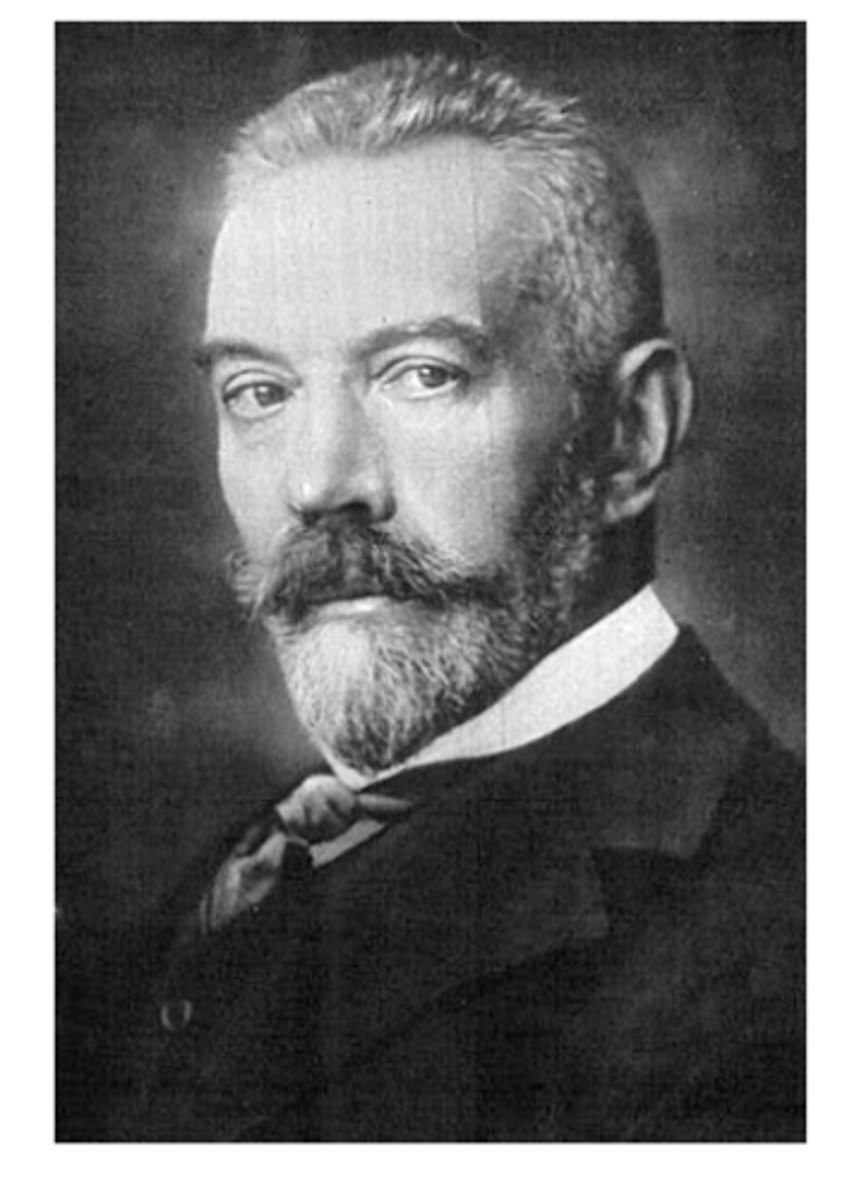
Bethmann-Hollweg's actions
Political reform - Attempted to increase the power of the middle class in the Prussian Three-class system
1911 - Universal male suffrage at 21 introduced
- Tried to manage bloated military
- Introduced defense tax to fund military
- Zabern affair
- Lost support of Reichstag, so was forced to rely on backroom deals, compromises, and the Kaiser
Defence tax,
1913
A policy introduced to increase the size of the army.
- Support from left as they wanted to tax the rich, even if they didn't want to increase the military
- Opposition from right as it would tax them
- Didn't solve the fiscal crisis
1914 - Debt at 5bn RM
Budgetary problems
The army and the navy proposed major expenditure plans.
Inheritance tax was finally accepted (pay for plans). Ironically this was opposed by the conservatives (supported the military plans) and supported by the socialists (who wanted a property-based tax).
Did not solve the crisis, by 1914 they were 5bn RM in debt.
5bn RM
Germany's national debt in 1914
Political reform by Bethmann-Hollweg
Demands for reform due to outdated 3-class system in Prussia (1908, SPD 23% 7 seats, Conservatives 16% 212 seats).
1910 - Introduced bill to increase power of the middle class in Prussia. Too radical for right, too moderate for left
1911 - Universal suffrage for men over 21
The SPD
Divided between orthodox marxists (revolution) and moderates (peaceful + within capitalism).
Supported defence tax.
Resented Prussian injustice, indirect taxes (hit poor more than rich) and high food prices.
Aware that most voters were patriotic and concerned about threat from Russia, France and England.
Nationalist associations
Pan German League, Navy League
More vocal in criticisms of weakness at home and abroad.
Many extreme nationalist were anti-socialist, anti-semitic and anti- parliamentarian.
Aryan superiority.
Dreamed of a new Bismarck - ruthless, aggressive policies.
Zabern affair,
1913
- Lieutenant Forstner insults Alsace-Lorraine citizens and French flag, in response to being teased for his boyish appearance
- He was punished
- Incident leaked to press, and demonstrations in the town
- Military called in, and charge the protestors, arresting them, including officials.
28 held in barracks overnight (the military had no power to do this).
- Brutality led to an outcry across Germany and a rejection of militarism as it was acting above the law.
- Military claims it is only responsible to the Kaiser, who condones the action and sent them away on manoeuvres.
Hollweg says that the army is not responsible to the reichstag,
- Reichstag called a vote of no confidence against Chancellor who supported the Kaiser.
- Vote of 293 to 54. But only the Kaiser can dismiss a Chancellor, so he stays
- Reichstag refuse to support Bethmann-Hollweg in the future
Vote of no confidence,
1913
Vote against Bethmann Hollweg after the Zabern Affair
- 293 votes to 54
- Empty gesture as only the Kaiser could dismiss the Chancellor
- Bethmann Hollweg never again had the support of the Reichstag
Bethmann-Hollweg's successes
- Prussian parliamentary reform
- Universal male suffrage
Bethmann-Hollweg's failures
- Inheritance tax blocked
- Tries to control the military
- Extremist pressure groups become more powerful
- Zabern affair
- Lost support of Reichstag
- Forced to rely on Kaiser to do anything
1912 - SPD became largest party in Reichstag
Reichstag
German Parliament
- Accepted or rejected legislation
- Couldn't introduce new laws
- Couldn't remove Chancellor
- Could be dissolved by Kaiser at any time
- Became less important under Wilhelm as they were often easily overruled by the Kaiser
- Ministers, Chancellor, Army, Kaiser weren't responsible to it
- Became more important as Wilhelm's Chancellors couldn't control it as easily as Bismarck
- Overruled by Kaiser's authority
- Supported Caprivi as he made concessions with them
1890 - Zentrum become largest party
1897 - Deadlock with Kaiser over socialism and refusal to pass any bills
1912 - SPD become largest party
Bundesrat
Upper house of German parliament made of up of representatives of the different states
- Influence declined after 1890
- Increasing number of bills introduced to Reichstag instead
Centre party
Largest party in Reichstag until 1912
AKA Zentrum
- Wide spectrum of socio-political views
- Allied with both right and left depending on situation
- Engineered Bulow's fall by supporting the right-wing in opposition to his bill to increase taxation, to get revenge for the Hottentot election
1890 - 106 seats
1912 - 91 seats
Right wing parties
Conservatives, Free Conservatives, National Liberals
- In decline
1887 - Won 50% of vote
1912 - Won 26% of vote
Meant the imperial govt had to find alternate means of support
Social Democrat Party (SPD)
Left party, largest party in Reichstag after 1912
1893 - 11% of vote (35 seats)
1912 - 28% of vote (110 seats)
Disorganised and split between moderates and progressives
Marxist programme vs minimum programme
- Helped by lapse of Anti-Socialist law in 1890
- Supported the Defence Tax to set precedent of property tax
- Opposed indirect taxation as it disproportionately affected the working class
- Supporters were patriotic and concerned about the perceived threat from France and UK
Largest party in the Reichstag
Zentrum: 1890 - 1912
SPD: 1912 - 1932
Marxist programme
A manifesto adopted by some members of the SPD that was based of the ideas of Karl Marx. Called for a violent overthrow of capitalist govt
Minimum programme
A manifesto adopted by some members of the SPD
Opposed to revolution, wanted to work within constitution to bring nationalisation and social equality
Nationalist groups
Pan-German League, Navy League, Colonial Society
- Became more vocal and critical of German govt
- Anti-socialist, anti-semitic, anti-parliamentarian
- Believed in Aryan superiority
- Start of Naziism
Interest groups
Became more powerful in 1890's
Economic - Agrarian League, Trade Unions
Nationalist - Pan-German League, Navy League, Colonial Society
Mainly due to growing political participation by middle class
Bundesstaaten
The 25 states of Imperial Germany
- Had representatives in the Bundestag
- Lost influence as their influence didn't increase, but the Central govt did
- Better communications and travel ended isolation, leading to the start of a German, not state, identity
- Prussia was the largest
Prussia
Largest state in Germany
- Still had 3-class system
- Haven of Conservatism
- Most German Chancellors were also Prussian Prime Ministers
Military
Held extensive influence over Wilhelm and a bastion of right-wing ideals
- Most officers were middle class
1913 - Over half of senior officers were aristocrats
- Felt superior to civilians
- Civilians loved them
- Obstacle to political modernisation
- Wilhelm's obsession
- Promotions based on connections not skill
Structuralism
Led by Hans-Ulrich Wehler.
Believed the political life of Germany was determined by economic forces
- Claimed WIlhelm II lacked strength and real power was held by Junkers
- Claimed weltpolitik was an attempt to reinforce the position of the elite
Evidence:
- Influence of key Junkers like Eulenberg. E.g. Putting Bulow in power
- Weltpolitik seen as a way to distract Germans from domestic problems
- Army was very powerful, bastion of right-wing ideals and opposed modernisation
- Growth of Trade Unions
- Agrarian and Navy Leagues were powerful
Anti-structuralism
Led by John Rohl
- Claims Junker influence was in decline
- WIlhelm was powerful and influential
Evidence:
- Junkers weren't united
- Middle class didn't take orders from Junkers
- Junker influence was in decline
- Military officers were increasingly middle class, not Junkers
- Wilhelm appointed Chancellor, minisers, and other key individuals
- Wilhelm's personal influence in foreign policy had disastrous effects
- Decrease of agriculture cut into Junker's wealth, reducing their influence
Authoritarianism
A style of governance characterised by a requirement of absolute obedience to a strong central state, usually 1 individual
- Structuralist view
Evidence Germany was this:
- Reichstag could be easily overridden by Kaiser
- Influence of Prussia
- Power of the military
- Vote of no Confidence against Bethmann Hollweg was pointless
- Chancellor, military, etc were responsible to Kaiser, not the Reichstag
- Central govt became more powerful
- The constitution gave the Reichstag little power
Democratic
A style of governance where the people have a say in govt policy
Evidence Germany was this
- Bundesrat was less powerful
- Reichstag grew in power
- Rise of pressure groups
- Increased political awareness
- Daily Telegraph, Eulenburg, Zabern affairs showed the Kaiser couldn't ignore public opinion
- Devolved powers (states) had control of local issues
- Freedom of Press to criticise Kaiser
- Fair elections for the Reichstag
- Govt needed Reichstag to pass legislation
- Military growth meant support of the Reichstag was needed to provided funding
- Leader's responded to public opinion
Left wing were a threat
- Increase in TU, pressure groups, parties
- Increased political awareness
- Erfurt program
- Marxists in the SPD
- Right wing in decline
- SPD largest party in 1912
- SPD largest socialist party in the world
- Able to prevent Bethmann Hollweg passing legislation
- Chancellor needed the Reichstag's support
Erfurt program,
1891
A meeting of socialists after the end of the Anti-socialist bill
- Overturned the Gotha program
- Stated that capitalism would fall because of its own failures, and therefore the SPD would focus on improving living standards rather than revolution, which was inevitable anyway
- Committed SPD to abolition of class, end of non-parliamentary govt, end of tariffs
Left wing weren't a threat
- SPD support balanced by right wing support
- Moderate faction in the SPD
- Failed to exploit opportunities (Zabern affair, Eulenburg affair, etc)
- SPD alienated from other parties, few allies
- Power still held by Junkers
- Members of SPD concerned with social benefits, not political
- Better working conditions led to decrease in revolutionary spirit
700%
Increase in German productive capacity (1870-1913)
German industry
- Steel production increased 9-fold
- AEG and Siemens dominated electrical industry
- Benz produced first car
- Increase in production of old industries
- Huge expansion of new industries
Reasons for industrial success
Population growth of 36%: 50m-68m (1890-1914)
Natural resources - Coal from Ruhr, Saar and Silesia; iron from Alsace-Lorraine
Railway system - Allowed for transportation of resources
Education - Trained workers and entrepreneurs
- Industry encouraged technological and scientific research
- Banks pursued long-term credit, close relationship between banks and businesses
- Cartels increased efficiency
- Agriculture allowed self-sufficiency
36%
Growth of the population of Germany from 1890-1914
(50 million to 68 million
Population growth
1890 - 50 million
1914 - 68 million
Increased market and workforce for growing economy
Increased urbanisation meant larger industrial workforce
1871 - 64% of population rural
1910 - 40% of population rural
Education
- Higher education institutes were world leading
- Offered study in traditional subjects and technical skills
1875 - 23,000
1890 - 28,000 enrollees (22% increase of 1875)
1912 - 72,000 enrollees (157% increase on 1890)
Degrees available to lower middle class
- This led to increased scientific research and development for industry
Banks
Financial institutions that accept deposits and make loans
- Essential in Germany's economic growth
- Generous long-term credit facilities for firms
- Close partnership with business
- Heavily invested in industry
- Instrumental in development of cartels
Cartel
An association of manufacturers who set prices, production to maintain a monopoly
- Illegal in UK and USA, encouraged in Germany
- Seen as means of achieving economic planning, promoting large scale production, and eliminating waste
1875 - 8 in Germany
1905 - 366 in Germany (4475% increase)
Gross National Product (GNP)
Total value of all goods and services produced in a country
Agriculture
1888 - 50% of GNP
1914 - <25% of GNP
Protected by govt tariffs
Yield and output rose
1882 - Employed 42% of the population
1907 - Employed 37% of the population
Germany remained self-sufficient in food supply
- Suffered from urbanisation
Coal
Output 1871 - 37.7 million tonnes (31.6% of UK)
Output 1910 - 222.2 million tonnes (82.69% of UK)
- 489% increase in output (1871-1910)
1914 - Germany mined 25% of the world's coal
Steel
Output 1871 - 0.14 million tonnes (34% of UK)
Output 1910 - 13.1 million tonnes (202% of UK)
- 9257% increase in output (1871-1910)
400%
Increase in Germany's industrial production 1871-1913
Imports
1880 - 2.8 billion marks
1913 - 10.8 billion marks
286% increase
Exports
1890 - 2.9 billion marks
1913 - 10.1 billion marks
248% increase
- 'Made in Germany' became internationally recognised of quality
Invisible exports
Exports of services like insurance, banking and investment profits
- Filled German trade gap
1914 - Germany 3rd largest creditor
1880 - Net export of 168m RM
1910 - Net export of 2211m RM
International trade
The exchange of goods and services among nations
- 286% in exports
1914 - Merchant fleet second only to UK
1914 - Germany responsible for 11% of world shipbuilding
1914 - Hamburg 3rd largest port in the world (in terms of value of trade flowing through)
- Colonies of little significance
- Most German trade with Europe, Asia, North America, South America
Pressure groups
Influenced public opinion and controlled political parties through funding and lobbying
- Cartels
- Trade Unions (3 million members)
- Central Association of German Industrialists (represented heavy industry)
- Confederation of Industrialists (represented manufacturers of finished goods)
- Agrarian League (represented agricultural industry)
- Other organisations for a range of economic interests
SPD - Allied with trade unions
DKP - Allied with Agrarian League
National Liberals - Allied with Agrarian League and CAGI
Zentrum party - Allied with peasants and Catholic working class
- Could threaten to end financial support for a political party
- Horse-trading
- Led to public distaste of the 'system' and political manoeuvring of organised interests
- Influence limited as govt more worried about fulfilling their own agenda
2.5 million
Members of Free Trade Unions in 1913 (733% increase on 1890)